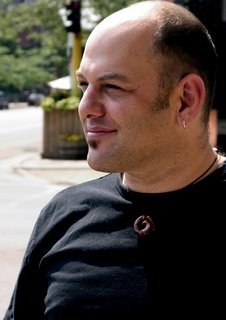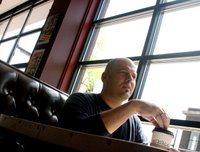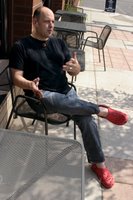 The sun glints off an amber pendant hanging around Henry Allen’s neck. It’s a Maori koru, a plump spiral representing continual growth and regeneration. It’s also a motif that has repeated itself in Allen’s life since his childhood abroad as the son of a foreign service diplomat. Today, as the artistic director of All of the Above Twin Cities Minnesota (AATCMN), Allen uses the symbol as a conceptual tool to organize his own life as well as tap into the creativity of those who participate in his performance collaborative and work tank.
The sun glints off an amber pendant hanging around Henry Allen’s neck. It’s a Maori koru, a plump spiral representing continual growth and regeneration. It’s also a motif that has repeated itself in Allen’s life since his childhood abroad as the son of a foreign service diplomat. Today, as the artistic director of All of the Above Twin Cities Minnesota (AATCMN), Allen uses the symbol as a conceptual tool to organize his own life as well as tap into the creativity of those who participate in his performance collaborative and work tank.With Joy Divine, Allen co-hosts The Divine Cocktail Lounge & Supper Show every Tuesday night at Jitter’s Martini Bar & Cabaret. It’s a multidisciplinary arts event, with gallery space and stage performances. Visual artists, from photographers to architects can mingle, display, and talk about their work. From 8 to 10pm, the Divine Cocktail Lounge showcases performance artists from comedians to belly dancers. After 10, the mic is opened up to newcomers interested in trying their talents out onstage in a safe environment.
The structure of the show, in fact, resembles the structure of Allen’s symbolic spiral. Featured artists are continually changing and growing. The morphology of featured work pushes boundaries into new territory, reaching beyond the closed circle that has traditionally divided “the Painter” from “the Dancer” and “the Singer.” From the beginning of the evening to the end, from one Tuesday to the next, there is an implicit understanding of organic growth and flux in the arts.
Rotunda of Infinite Doors
For Allen, the philosophy of spiraling beginnings has been long in the works. The son of a foreign service diplomat, he spent much of his childhood abroad. Growing up in opulent mansions in countries including Brazil, Austria, Russia, Cuba, and Peru, the influences on his own personal development were wide-ranging and at times contradictory.
On the one hand, it was a life of privilege, replete with glamorous parties during which Allen would organize troupes of visiting diplomat children to perform variety shows. They had sprawling gardens and Allen was placed in charge of a menagerie of exotic animals (monkeys, toucans, goats, and owls received as gifts from visiting dignitaries). He attended American schools (where, he laments, the teachers seemed more interested in glamour than pedagogy) and traveled the globe in a way that few children have the opportunity to do.
On the other hand, it was a life of service, with a continually shifting cultural landscape to adapt to and an extended family of household servants with whom he spent much of his time. Through these servants, who often had deep spiritual beliefs and had made the decision to live their lives in service to others, Allen began to recognize the impact of what it meant to make that choice to “do your work” as an authentic being.
Allen says he felt for a long time as if he were continually passing through a rotunda with an infinite number of doors. He’d choose to go through one door, only to find that it opened up into another rotunda with another infinite set of potential paths. Though exhilarating, it was dizzying in the sense that he felt he had no direction in his life. A wise friend suggested, finally, that he stop for a while to live in the moment, “Sit on one of the benches and look up at the ceiling. Or if that’s not comfortable, try sitting on the floor.”
Leading Out of What is Already There
 At thirteen, Allen left home (then Brazil) to attend a private boarding school in Connecticut. The school had a distinctly athletic bent to it; a tradition that Allen could not fully partake in, having been diagnosed with Osgood Schlatter’s disease (similar to juvenile arthritis). Since film had long held an ongoing fascination for him, Allen turned instead to the performing arts. There was something about “holding up the celluloid. It was a sensual experience for me – the sound of film going through the gears, the smell of the light bulb.” Though little else about the school captivated his imagination, Allen was attracted to the power of live theatre and participated in nine shows over a three-year period.
At thirteen, Allen left home (then Brazil) to attend a private boarding school in Connecticut. The school had a distinctly athletic bent to it; a tradition that Allen could not fully partake in, having been diagnosed with Osgood Schlatter’s disease (similar to juvenile arthritis). Since film had long held an ongoing fascination for him, Allen turned instead to the performing arts. There was something about “holding up the celluloid. It was a sensual experience for me – the sound of film going through the gears, the smell of the light bulb.” Though little else about the school captivated his imagination, Allen was attracted to the power of live theatre and participated in nine shows over a three-year period.While he admits that the educational institutions he attended were privileged, Allen remains unimpressed with his schooling. He considers himself to be essentially an autodidact and firmly believes in the idea of education as something that leads out of individual growth. A strong supporter of the Waldorf perspective on education, which emphasizes nurturing the creative spirit and sense of self, Allen once worked with the City of the Lakes Waldorf School in Minneapolis, where his son attended school for eight years.
“Have you seen The Prime of Miss Jean Brodie?” he asks me, and then quotes one of his favorite lines from the movie, “To me, education is a leading out. The word education comes from the root ‘ex,’ meaning ‘out,’ and ‘duco..’ ‘I lead.’ To me, education is simply a leading out of what is already there.” In response to the idea that education might involve “a certain amount of putting in,” Miss Brodie retorts, “That would not be education, but intrusion...from the root prefix ‘in,‘ meaning ‘in,’ and the stem ‘trudo’...‘I thrust.’ Ergo, to thrust a lot of information into a pupil's head.”
Today, Allen has his MFA from the National Theatre Conservatory, but the pivotal moments he references come directly from life rather than academia. One of these was an exchange he recalls having with his father during the three and a half hour drive to college. Eighteen at the time, he asked his father (whose personality he describes as a combination of Fidel Castro, Benito Mussolini, and Mel Brooks), “Do you like what you do?” His father replied, “I loathe it.” “Then why do you do it?” His father thought for a moment, then said, “Well, son, that’s the price you pay when you want your family to be proud of you…”
When he pursued the topic and asked his father what he had wanted to be as a child, the response was, “I don’t remember.” Yet moments later, tears trickled down his father’s cheeks as he recalled that he had wanted to be a photographer and reporter for National Geographic. Allen says, “It was a turning point for me in terms of career choices. My father’s failure is my triumph.”
Now Allen makes a careful distinction between “a job” and “work.” A job “is something that you can’t wait to get home from,” while work is “something that you are living for.” Since his single stab at a “job,” where he says he ultimately felt stuck, Allen has focused on doing work that is meaningful and allows him to be authentic. Invaluable experiences with organizations like the Waldorf school, Steppingstone Theatre, Wild Rumpus, and Wells Fargo have proven that it’s possible to choose a life in service and do the work out of a love for the task itself. “There are fat months and lean months,” says Allen, but in the end it’s worth it.
Labels are for Food Cans
 One of the big influences on Allen’s life was a grandmother in Florida who used to say, “Labels are for food cans.” It’s a message Allen has taken to heart in virtually every aspect of his life, both personally and professionally. His response is to create bridges between categories where none existed before, positioning himself in a place of perpetual new beginnings, new stories, and new ways of thinking and doing.
One of the big influences on Allen’s life was a grandmother in Florida who used to say, “Labels are for food cans.” It’s a message Allen has taken to heart in virtually every aspect of his life, both personally and professionally. His response is to create bridges between categories where none existed before, positioning himself in a place of perpetual new beginnings, new stories, and new ways of thinking and doing.Allen’s son Cameron is also a continuing thread in our conversation. Allen survived testicular cancer with a fifty percent possibility of being sterile and seems now to truly appreciate his role in life as a parent. He talks about holding his son when he was a newborn and asking himself, “What can I offer you as a parent?” The answer that came to him was not materialistic, but spiritual: “your whole self, to walk authentically in the world.”
That thought has not only informed Allen’s decision about what messages he should pass on about work, money, and materialism, but also life in a Rainbow family. Though Allen “came out” at the age of eighteen, he was married to a woman for seven years. While he accepts that labels like “gay” or “bi-sexual” are generally easier for people to understand, Allen says that, “I recognized very early that what attracted me to another being was not what’s between their legs. It’s their character, compassion, integrity.."
When Allen and his wife divorced seven years ago, their son’s attitude was positive and open, “You mean I get to have two houses? Yippee!” At eleven, Cameron isn’t troubled by the fact that his father dates other men, nor does he really question why his mother is heterosexual while his father isn’t. Because there aren’t a lot of storybooks geared towards the GLBT community, Allen improvised stories for his son about non-traditional relationships, like two princesses who fall in love. It’s a part of life, part of the human experience. “Fat people fall in love too,” Allen points out, and there aren’t a lot of storybooks out there on that subject either.
Once an actor whose weight exceeded that of those who traditionally get cast in romantic leads, it’s another boundary he’s worked to move beyond. At a maximum weight of 336 lbs, there was a time when Allen had difficulty landing the acting parts that he connected to. Neither directors nor audiences felt comfortable seeing an overweight man in a romantic role, and so he’d inevitably wind up as a supporting character. Over time, he’s lost the weight, but remains mindful of the invisible barrier in perception.
As if drawn by a “deep sense of fate,” Allen recently joined the board of directors with Outward Spiral, a theatre company whose mission is to move beyond conventional views and represent queer and outsider perspectives. The symbolism of the spiral, he tells me, is pure coincidence, but the connection is genuine.
Creativity in life and in work is what lies at the heart of Allen’s performance collaborative and work tank through AATCMN. Through an exploration of personal biographies, he helps clients tap into their creative spirits and move away from inertia and interpersonal barriers. He’s not a life coach, but more of a creative consultant who works to draw out the talents and interests that are already present in an individual. He also focuses on issues of trust, cooperation, and teambuilding in group contexts.
The emphasis in his work is on stepping out of the label and becoming an authentic human being. The mission of AATCMN is "to debut artists with integrity and passion" and to "awaken the creativity that exists in every human being, and teach how to apply it to one's life and work." Facilitating that potential for transformation in others is tremendously rewarding, says Allen, and the process itself is a magnificent thing to behold.
Visit AATCMN
Photos by Dwayne Williams

No comments:
Post a Comment